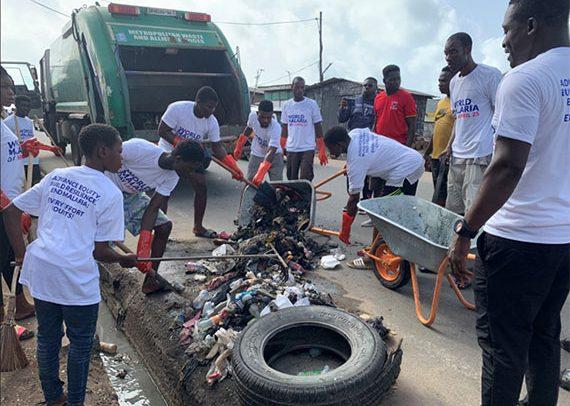Africa-Press – Ghana. Novartis, a global healthcare company on Monday organised a clean-up exercise at Chorkor to mark the observation of the World Malaria Day.
The exercise, which lasted for over two hours in the morning cleared stagnant waters, which served as breeding grounds for mosquitoes.
Mosquitoes are common flying insects or parasites that cause malaria through bites.
Mr Ernest Selase Dufay, a medical representative at Novartis said malaria could be controlled and prevented when environments were kept clean.
Mr Dufay said Novartis selected the Chorkor community for the clean-up exercise because it was a malaria prone area.
He said the level of sanitation or cleanliness at Chorkor was below average because it was densely populated.
“We came here today to create awareness on how malaria can be prevented and how residents can protect themselves.”
Mr Theophilus Isaac Nii Kpakpo Quaye, Assembly Member for Chorkor, said the clean-up exercise would help reduce the high incidence of malaria in the community.
He urged residents of Chorkor to practice good sanitation.
Mr Quaye thanked Novartis for choosing Chorkor, and appealed to them to repeat the gesture often.
World Malaria Day (WMD) is marked annually on 25 April to focus global attention on malaria, and its devastating impact on families, communities and societal development, especially in Sub-Saharan Africa.
This year’s celebration is on the theme, “Harness innovation to reduce the malaria disease burden and save lives.”
It aligns with the World Health Organization’s (WHO) call to urgently scale up innovation and the deployment of new tools in the fight against malaria, while advocating for equitable access to malaria prevention and treatment, within the context of building health system resilience.
The WHO says no single tool that is available today will solve the problem of malaria and calls for investments and innovation that brings new vector control approaches, diagnostics, antimalarial medicines and other tools to speed the pace of progress against malaria.
It says despite steady advances in lowering the global burden of malaria between 2000 and 2015, progress has slowed or stalled in recent years, particularly in high burden countries in sub-Saharan Africa.
For More News And Analysis About Ghana Follow Africa-Press







